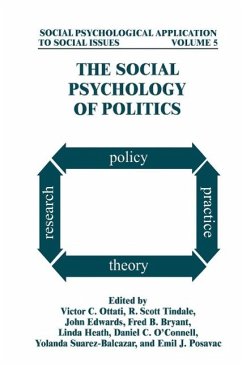
Psychological Processes in International Negotiations (eBook, PDF)
Theoretical and Practical Perspectives
Versandkostenfrei!
Sofort per Download lieferbar
40,95 €
inkl. MwSt.
Weitere Ausgaben:

PAYBACK Punkte
20 °P sammeln!
A unique collaboration between experts in cognitive psychotherapy and political science, this book emphasizes the value of human psychology in negotiation and mediation. Drawing on a wide range of theory and data, from neuroscientific findings and historical events to the rational-emotive model of behavior, the book explains how the negotiation process works, under both adverse and optimum conditions. The authors identify psychological elements that have the greatest effect on negotiation outcomes, including group identity and groupthink, egocentrism, emotional awareness and competence. They a...
A unique collaboration between experts in cognitive psychotherapy and political science, this book emphasizes the value of human psychology in negotiation and mediation. Drawing on a wide range of theory and data, from neuroscientific findings and historical events to the rational-emotive model of behavior, the book explains how the negotiation process works, under both adverse and optimum conditions. The authors identify psychological elements that have the greatest effect on negotiation outcomes, including group identity and groupthink, egocentrism, emotional awareness and competence. They also detail the various interpersonal and communication skills as well as the steps readers can take to improve their performance. In addition, coverage identifies emotive keys to coping with stalemates and provides solid links between theoretical and practical material. This book provides negotiators with the tools needed to come to clear judgments and creative, non-aggressive solutions.
Dieser Download kann aus rechtlichen Gründen nur mit Rechnungsadresse in A, B, BG, CY, CZ, D, DK, EW, E, FIN, F, GR, HR, H, IRL, I, LT, L, LR, M, NL, PL, P, R, S, SLO, SK ausgeliefert werden.













